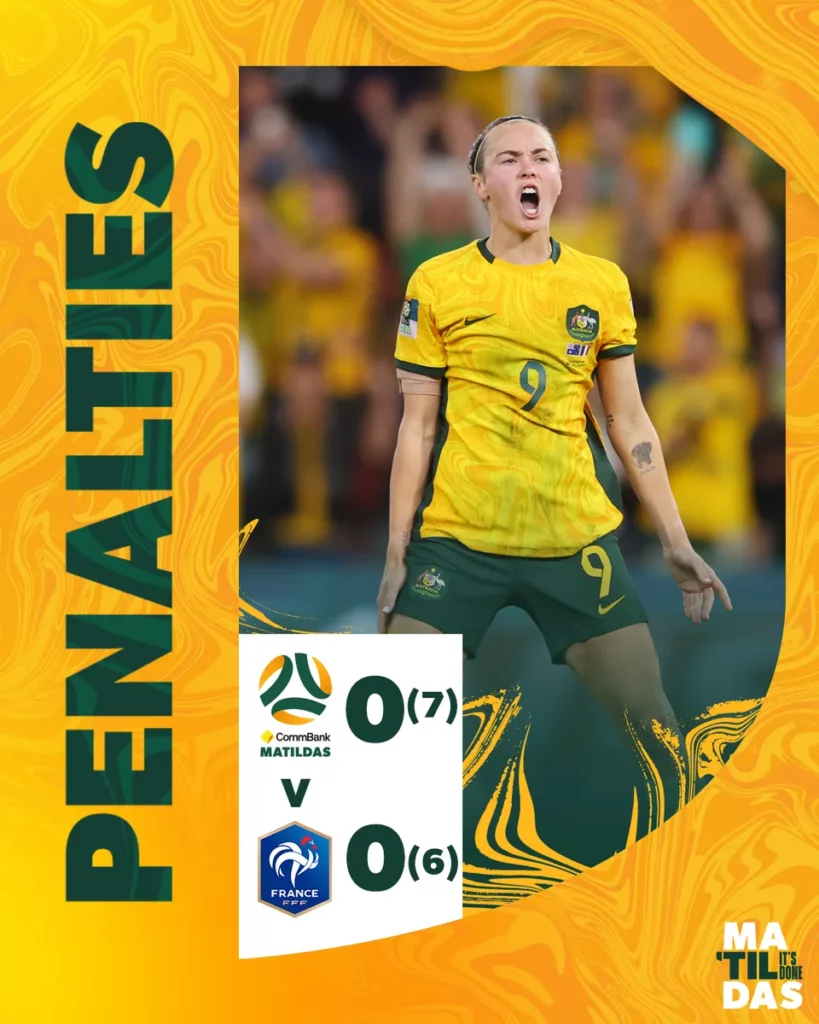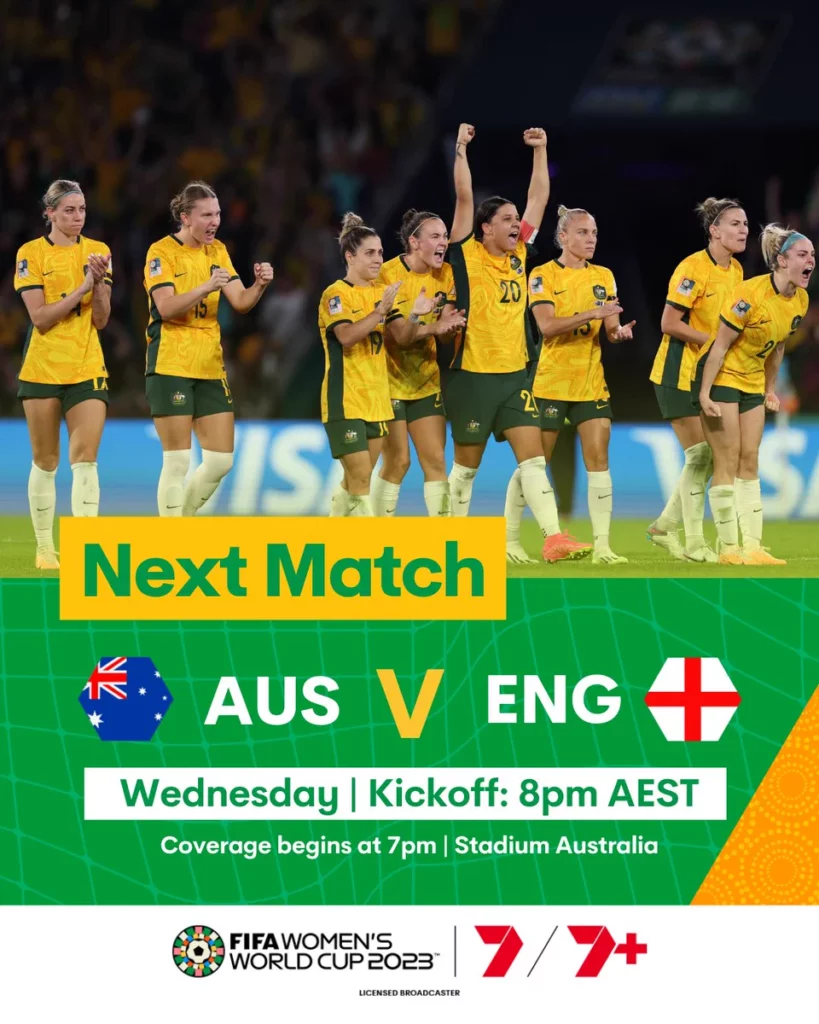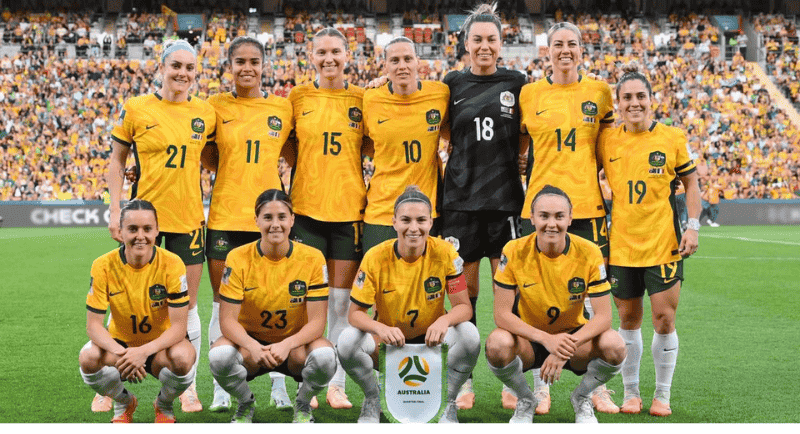How did Seven manage to get the Matildas at such a bargain basement price? In the past few decades, the cost of sports rights have ballooned as broadcasters realised their importance to secure big audiences and big brands.
It’s rare for a broadcaster to score a sports bargain these days. But that was what Seven chief executive James Warburton and head of sport Lewis Martin got with their Women’s World Cup rights package.
Seven’s chief revenue officer Kurt Burnette initiated the deal with Australian rights hold Optus Sport and agreed on a joint sell to market which proved very successful.
While there is disagreement over speculation of what Optus Sport paid FIFA, there is consensus about the amount Seven handed over.
Reports have speculated that Optus paid as much as $60m (The SMH) or no more than $10m (The AFR) for tournament coverage. Whatever that amount was, there is agreement that the amount Seven paid Optus Sport was between $4-5 million.
For that outlay, Seven got the rights to screen 15 matches. That package could have included as few as three Matildas matches if they bombed out in the group stage. But because of the form of the Matildas, Seven is now guaranteed seven matches featuring the Australian team. Even if they don’t make the final, the Matildas will get to play in the match to decide third and fourth place in the tournament.

Seven’s Super Saturday challenges
Seven had to deal with a number of challenges on Saturday as it catered to the biggest Australian sporting crowd in over a decade.
One of the biggest was the health of Bruce McAvaney. He was unable to front the broadcast on Saturday with Adam Peacock taking over as co-host with Mel McLaughlin. They wish Bruce a speedy recovery at the start of the Matildas’ pre-game show.
The network’s challenges developed as the evening wore on. Seven was already committed to screening four AFL matches live into different markets across the day.
At Suncorp stadium things got underway with the Pre-Game hour and then the Matildas v France game. That then went into 30 minutes extra time which then went to penalties.
Seven bravely stayed with the live game coverage, not having a commercial break from the halftime point of the game until during the post-match coverage. During more than an hour-and-a-half of nail-biting World Cup football, the only commercial messages on Seven were seen via a squeeze-back (when the screen shrinks a little to allow a sponsor’s message at the bottom of the screen). This is the first time FIFA has allowed such a commercial to be run during World Cup game coverage.
The extra time threw the 7News schedule out the window with news going out eventually or not at all much later than usual around the network.
7plus was a robust platform too on Saturday as it catered to just under a record half a million watching the Matildas, let alone the audience watching all the other viewing options. Both live and on-demand.

Matildas Total TV ratings figures
Australia v France 4,162,000 (Preliminary)
Australia v Denmark 3,633,000
Australia v Canada 2,458,000
Australia v Nigeria 1,510,000
Australia v Ireland 1,974,000
More detailed Matildas’ ratings analysis here.
Seven is not the only broadcaster that got a bargain. Major European were playing hardball and they too wanted a bargain. While Optus Sport secured its rights package two years ago, less than 50 days before kick-off, England, Germany, Italy, France and Spain were still arguing the amount with FIFA.
Whoever manages to land the Australian rights for the next Women’s World Cup will probably have to pay a lot more than both Optus Sport and Seven spent for 2023.
Sports broadcasting consultant Colin Smith told News Corp’s Jamie Pandaram that means the next Women’s World Cup will cost the broadcaster at least $30m.
Smith told Pandaram: “FIFA would be rubbing their hands with glee next time they’re selling the rights, they won’t have the same challenges of threatening broadcasters in Europe et cetera.
“And how brilliant a strategy has Channel 7 devised, got 15 games, didn’t pay a lot for it at all. Who would have expected when they acquired those 15 that there would be a game, in a round of 16, not even a quarter-final, that would be bigger than State of Origin, bigger than the NRL Grand Final, bigger than the AFL Grand Final? No one.”
Seven’s head of sport Lewis Martin told Mediaweek recently it wanted to make sure the Matildas’ games were presented properly.
There will be no commentating from monitors in the studio for the FTA Women’s World Cup broadcaster in 2023, he said “We will be live and on location for all Matilda’s games and for the finals,” explained Martin. “We have about 50 people working on the coverage. We felt it was important to be there on site.”
Sponsors windfall
The Seven Network and Optus Sport joined forces with brands as partners and sponsors for the coverage of the FIFA Women’s World Cup 2023 on Seven, 7mate, 7plus, and Optus Sport.
Seven and Optus Sport’s partners are adidas, Hyundai, Rexona, and Qantas, while the sponsors are Cadbury, Coca-Cola, Kia, McDonald’s, Visa, and Xero.
Seven West Media chief revenue officer Kurt Burnette said before the tournament started: “Seven is Australia’s home of culturally defining sport, entertainment, and information and from 20 July, our coverage of the FIFA Women’s World Cup 2023 will unite the country, stir nationwide pride and inspire the next generation. Our partners and sponsors will be the beneficiaries, as the halo of this major cultural event lifts audiences of our new and existing content right across Seven and 7plus.” Little did Burnette realise then he was probably underselling how big it would be.
Mediaweek’s Tess Connery spoke to Seven West Media national sport sales director Rob Maclean recently about what such a massive global event means for advertisers, and how Seven will be making the most of the Women’s World Cup.
“We fully expect this Women’s World Cup broadcast to deliver strong audiences right across the screens of Seven, but ultimately, if BVOD is much stronger than what we anticipate or vice versa with linear, our brands are still being rewarded. We’re recognising that audience wherever fans are consuming the content.”
However the tournament ends, Seven will burst its original audience projections. The total reach for the Australia v France game alone was 7.2m and there’s lots more to come.
See also: Matildas World Cup TV ratings: Matildas v France clash sets new Seven and Optus Sport records
